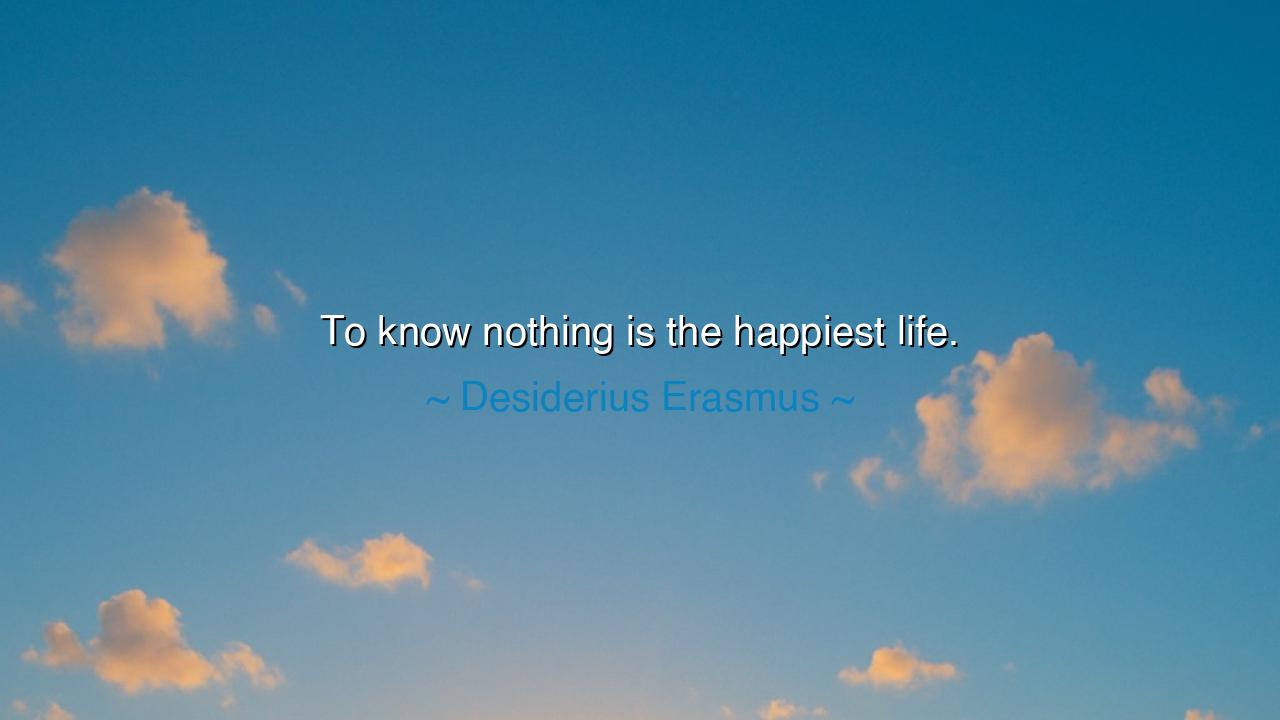
To know nothing is the happiest life.






“To know nothing is the happiest life.” Thus wrote Desiderius Erasmus, the great scholar of the Renaissance, whose wit and wisdom pierced through the glitter of learning to reveal the deeper ache of the human heart. These words may seem strange coming from one of the most learned men of his age—a man who dwelt among books and knowledge like a bee among flowers. Yet in this paradox lies a profound truth: that knowledge, when untempered by humility and peace, becomes a burden. To “know nothing,” in Erasmus’s sense, is not the ignorance of the fool, but the innocence of the soul that has laid down its anxious need to master the world. It is the wisdom of simplicity—the peace that comes when one ceases to wrestle with every mystery and learns instead to be.
In his masterpiece The Praise of Folly, Erasmus spoke through the playful voice of “Folly” herself, who mocked the scholars, the priests, and the philosophers of his day. He showed that those who pride themselves on knowledge often live furthest from happiness, for they are tangled in endless questioning, weighed down by doubt, and blinded by their own intellect. The mind that forever seeks to control life forgets how to live it. The man who must understand all things loses wonder; the man who must be right loses peace. Thus, Erasmus’s “knowing nothing” is the return to the childlike state—curious, joyful, and untroubled by the need to command truth. It is an invitation to rediscover the laughter of being alive.
The ancients, too, understood this mystery. The oracle of Delphi declared that Socrates was the wisest of men because he alone admitted that he knew nothing. And what was Socrates’ wisdom but humility before the infinite? He knew that truth was larger than the mind could grasp, and so he lived not in arrogance but in awe. The fool believes he has all the answers; the wise man kneels before the vastness of the unknown. Erasmus, inheritor of this same spirit, saw in the restless learning of his age a kind of sickness—a pride that robbed men of contentment. He longed for a return to the simple joy of unknowing, where peace replaces ambition, and laughter conquers fear.
Consider the story of Diogenes of Sinope, the ancient cynic who lived in a barrel, owning nothing, mocking the pretensions of the powerful. When Alexander the Great stood before him and asked, “What can I give you?”, Diogenes replied, “Stand out of my sunlight.” Here was a man who knew nothing of riches, titles, or scholarly debates, yet possessed a serenity that no emperor could buy. His ignorance of worldly ambition was his freedom. He had learned the art of joyful simplicity, the same art Erasmus praises—the wisdom of one who has no need to prove, to possess, or to conquer. The less he knew of the world’s illusions, the happier he became.
But Erasmus’s insight is not an escape from thought; it is a healing of the heart. He does not despise learning—he warns against being ruled by it. For when knowledge feeds pride rather than understanding, it darkens the spirit. The man who “knows nothing” in Erasmus’s sense is not empty, but open. He lives lightly, curious but unafraid of mystery. He does not fret over what cannot be known; he delights in what can be felt, touched, and loved. In that surrender to life’s flow, he finds a deeper intelligence—the intelligence of peace.
In our modern age, where knowledge is boundless and anxiety grows in proportion, Erasmus’s words strike like a bell across centuries. We drown in information but starve for wisdom; we know the movements of stars but not the stillness of the soul. The ancients would call this the tragedy of hubris—man’s arrogance in believing that knowing is the same as understanding. The one who knows nothing, on the other hand, is free. He can wonder at the sunset without analyzing its physics; he can love without dissecting emotion. He can live in the moment, unburdened by the endless machinery of thought.
So, my child of the restless mind, take this teaching to heart: learn deeply, but hold your knowledge lightly. Do not let it become a crown of vanity or a chain of worry. When you encounter mystery, smile at it; when you meet uncertainty, bow to it. The happiest life is not the life that knows all things, but the one that accepts that not all things need to be known. Let go of the need to grasp everything, and you will find that the world itself will open its arms to you.
Thus, the wisdom of Erasmus stands clear: to know nothing is not ignorance—it is peace. It is to live as the birds live, the rivers flow, the stars shine—simply, freely, and with joy. For in the end, the wisest among us are not those who have conquered the world through intellect, but those who have surrendered to the wonder of simply being alive.






AAdministratorAdministrator
Welcome, honored guests. Please leave a comment, we will respond soon